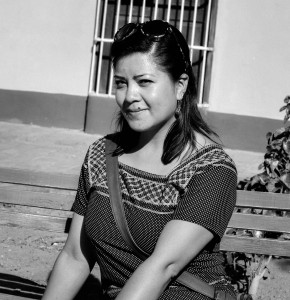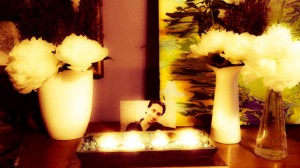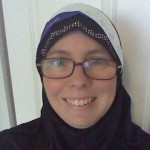Please welcome writer Eren Cervantes-Altamirano whose column Flirting with Fate and other Disasters of an Intersectional Muslimah will appear the first Thursday of every month. Her piece below, written in July 2014, sets the stage for her new column here at LoveinshAllah.com

Perhaps it is absurd of me to think that Ramadan will ever be a time of peace and refection. From the moment I converted, my patience, my love for Islam and my faith have been constantly tested. Beyond the struggle of belonging to a non-Muslim family, the reconciliation of new acquired identities and the challenges of trying to fit into mainstream Muslim communities, this year I started Ramadan off surrounded by death.
As the month of Ramadan approached and I prepared to fast, I lost my life partner in a sudden accident. He was planning to travel from Saudi Arabia to Canada to visit me after Ramadan. The news came as a shock to all who knew him. He was young, full of life and had many dreams.
Such an unexpected event brings the sudden awareness of the fragility of earthly life, and it also show us the best and worst of the Muslim communities that surround us. Saad’s death is something I had to think and rethink in order to rationalize completely. I can’t say that the process is over yet. But his death has also made me question my own place among Muslims as a convert, as an Indigenous woman from Mexico, and as a “sinner.”
I grew up in a conservative Catholic environment where the idea of the Original Sin continues to be preached and baptisms are recommended. Even though many Muslims reject the idea of sin from birth, I have found striking resemblances between ideas of sin and the “guilt” treatment perpetrated against those who “do not fit.” You have the sin of pre-marital relationships, the sin of LGBTQ love, the sin of not wearing certain garments, and the sin of being a woman of colour who questions and critiques mainstream interpretations, among others.
Saad’s passing was a constant reminder of my “sins” and the status that I have failed to acquire among mainstream Muslim communities in Canada and abroad. The hours following the accident were extremely stressful, I not only had to come to terms with the loss of Saad, but the only contact I had with the events in Saudi Arabia was through a friend. No contact from the family, no further details.
After seven years of companionship our relationship is tainted by the lack of a proper marriage ceremony and the family’s lack of acceptance. I was never good enough for them or even Saad’s friends and acquaintances because of my nationality, my colour and my background. For many of them my worse sin was “tempting” their perfectly raised, conservative Saudi man.
The loss of my partner was experienced from a distance. I had no right to the rituals, and I am still not entitled to the communal healing experience. Nonetheless, I have been blessed with a family which, despite differences and religious disagreements, has been able to put all that aside to support me and honour the life of a Muslim who considered himself “a moderate, practicing Sunni.” Following the tradition of my mother’s land in southern Mexico, Saad’s picture stands in the living room along with flowers and candles that are lit every day. My family has attempted to guide his next “trip” with sweetgrass inspired by the tradition of some First Nations in this land where we are visitors. Nonetheless, they understood that Saad would also want to be honoured in a “Muslim” way.

The few days preceding Ramadan were filled with anger and tears. Not only was my family denied any kind of “closure” ceremony by mainstream Muslim leaders because they are not Muslim, but because there was no marriage contract or because that’s simply “not the way we do it,” I was reminded that I am one more number in the Dawah books who will continue to be poorly supported by institutional Islam. You know, the institutional Islam that prides itself in saying that “X” number of women are converting to Islam (something I have discussed before), but which provides little support to us as convert women.
After several years as a convert I find myself wondering, why am I being punished? Because I am considered a fornicator? Because I am suspected to be less of a Muslim? Or because I do not believe that mainstream understandings of death and mourning help those of us who continue on? As I went through the process of trying to honour Saad in a way meaningful to him, I discovered that many Muslims have a troubled relationship with death. Many fear it, neglect it and ignore it. Some believe that the responsibility to the dead ends with the burial of a body and funeral rituals that often lack women and non-Muslims. Such an understanding of death clashes with mainstream Mexican understandings of loss and grief and certainly violate Indigenous views on the cycles of life and death.
Nevertheless, in the eyes of Muslim leaders in my community my reasons for wanting to honour Saad were not good enough. I was constantly told that this is bid’a, that this is not Islam, and that I was engaging in a dangerous behaviour that could lead to a major sin. The options I was offered instead were to leave the issue alone and “move on.” A friend’s family member even told me, “you are still young and there are many men out there. Find another one.”
But in the darkness of the past days, I was blessed with the help of a broader network of Muslims who, above all, believe that Islam should be about love, support and healing. I was not only offered support by El-Tawhid Juma Circle but also by Muslims for Progressive Values in Ottawa and Edmonton. My family was hosted by a United Church in Edmonton in a Muslim ceremony that honoured Saad’s memory and sought to ease the family’s healing process. Of course, very few Muslims attended, fearing being labelled as “sinners.”
After days of being treated with skepticism and being categorized as a “sinner,” I stand in the middle of the month of Ramadan not questioning my faith, or the tragic events that led to Saad’s passing, but instead questioning the purpose of my own shahadah. What does it mean to be a Muslim convert when every time I have needed support I have had to scramble for it? What does it mean to “be part” of a community that questions my ethnic and racial background and doubts my knowledge and faith? What does it mean to be a “good” Muslim vs. a “sinner” like me?
Thus, as the Catholic creed taught me, I guess I should start every interaction by saying: Forgive me Allah for I have sinned…Forgive me Muslims for I am a sinner.
—
Reposted with permission by the author from her website Identity Crisis.
Eren Cervantes-Altamirano is an Indigenous-Latin American convert to Islam. She is currently working on her MA in Public Administration (supposedly). Eren’s blog Identity Crisis focuses on her multiple identities and how to reconcile them when they are at odds with each other. She also blogs at Muslimah Media Watch. When she is not writing, Eren can be found baking, knitting and sewing and oh yeah… dating. Follow her at @ErenArruna.















